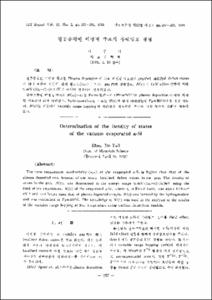혈중 L-carnitine농도 측정의 임상적 유용성
- Alternative Title
- Evaluation of clinical value for determination of L-carnitine level in blood
- Abstract
- L-carnitine is an essential cofactor for the transport of long-chain fatty acids into mitochondria for β-oxidation. Carnitine deficiencies either due to primary or secondary causes are presented as a myopathic type or systemic type like an encephalopathy due to metabolic disturbances or even fatal cardiomyopathy. The definite diagnosis of carnitine deficiency is based on the determination of free- and acyl-carnitine concentrations in blood, urine, or various tissues and the clinical response to replacement of oral L-carnitine.
We reviewed 50 patients requested blood carnitine determination to evaluate diagnostic efficacy of this test. Enzymatic method with carnitine acetyltransferase and acetyl CoA as a substrate was used to determine carnitine concentration in plasma or serum. Normal carnitine levels were obtained from 41 control children and ranged from 7.2 mg/L(44,4 μmol/L) to 12.9 ml/L(79.5 μmol/L). Twenty-four of 50 patients had carnitine concentrations lower than 7.2 mg/L(44.4 μmol/L) and their clinical findings were cardiomyopathy, congenital heart disease complicated with congestive heart failure, organic acidurias and metabolic disturbances. The clinical manifestations of patients were definitely improved in 10 patients out of 16 after treatment with L-carnitine.
Early recognition and high dose of carnitine therapy are mainstay of carnitine deficiency. In conclusion, all patients suspected carnitine deficiency either due to primary or secondary causes should be assessed and monitored their carnitine levels before and after treatment.
L-carnitine is an essential cofactor for the transport of long-chain fatty acids into mitochondria for β-oxidation. Carnitine deficiencies either due to primary or secondary causes are presented as a myopathic type or systemic type like an encephalopathy due to metabolic disturbances or even fatal cardiomyopathy. The definite diagnosis of carnitine deficiency is based on the determination of free- and acyl-carnitine concentrations in blood, urine, or various tissues and the clinical response to replacement of oral L-carnitine.
We reviewed 50 patients requested blood carnitine determination to evaluate diagnostic efficacy of this test. Enzymatic method with carnitine acetyltransferase and acetyl CoA as a substrate was used to determine carnitine concentration in plasma or serum. Normal carnitine levels were obtained from 41 control children and ranged from 7.2 mg/L(44,4 μmol/L) to 12.9 ml/L(79.5 μmol/L). Twenty-four of 50 patients had carnitine concentrations lower than 7.2 mg/L(44.4 μmol/L) and their clinical findings were cardiomyopathy, congenital heart disease complicated with congestive heart failure, organic acidurias and metabolic disturbances. The clinical manifestations of patients were definitely improved in 10 patients out of 16 after treatment with L-carnitine.
Early recognition and high dose of carnitine therapy are mainstay of carnitine deficiency. In conclusion, all patients suspected carnitine deficiency either due to primary or secondary causes should be assessed and monitored their carnitine levels before and after treatment.
- Issued Date
- 1994
- Type
- Research Laboratory
- Alternative Author(s)
- Chi,Hyun Sook; Seo,Eul Ju; kang,Eun Suk
- Publisher
- 울산의대학술지
- Language
- kor
- Rights
- 울산대학교 저작물은 저작권에 의해 보호받습니다.
- Citation Volume
- 3
- Citation Number
- 2
- Citation Start Page
- 26
- Citation End Page
- 32
- Appears in Collections:
- Research Laboratory > The ULSAN university medical journal
- 파일 목록
-
-
Download
 000002024838.pdf
기타 데이터 / 174.65 kB / Adobe PDF
000002024838.pdf
기타 데이터 / 174.65 kB / Adobe PDF
-
Items in Repository are protected by copyright, with all rights reserved, unless otherwise indicated.